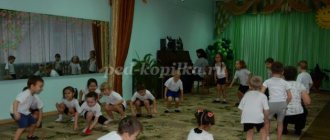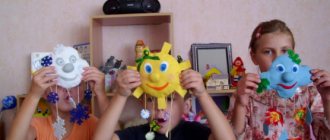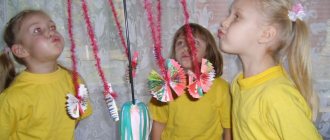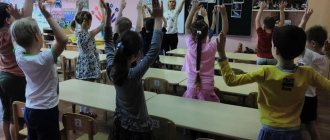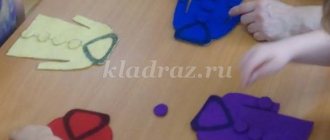Recommendations for performing gymnastics
Before starting classes, you need to ventilate the room well. The more positive the child is, the greater the effect the exercises will have. Rules for performing gymnastics:
- You should not start exercising after eating. It is better to wait 40-60 minutes so as not to harm digestion.
- You can't exercise while hungry; it can lead to dizziness.
- The exercises should be performed in a relaxed state.
- Inhalation is done only through the nose.
- Gymnastics can be performed in the afternoon, but not before bedtime, as it invigorates, so it will be difficult to put the child to sleep.
- Children 2-3 years old are not distinguished by endurance and perseverance, so you should start with 1-2 exercises and gradually introduce the rest.
- After each exercise, do not forget to take a break.
Do not under any circumstances refuse medications prescribed by your doctor, especially if the illness is severe and chronic! Breathing exercises are a powerful healing technique, but they only accompany drug treatment.
If during some exercise the child turns pale, breathes quickly or becomes dizzy, then you need to stop the gymnastics immediately. This condition is caused by hyperventilation of the lungs. If you are overtired, you need to fold your baby’s palms into a boat and immerse your face in them, while breathing deeply and calmly. Due to the risk of hyperventilation, asthmatic children need to undergo a set of exercises under the supervision of a doctor to avoid overwork, which is bad for a weak respiratory system.
Gymnastics has contraindications:
- Heart disease - a diseased organ may not withstand the load.
- Inflammatory diseases of the lungs in acute form. There is no need to overload the respiratory organs during this period.
- Viral respiratory infections in acute form. Until all toxins are cleared from the body, there is no need to accelerate blood flow.
Content
- The benefits of breathing exercises for preschool children
- Working on breathing: exercises for children
- Exercise "Balloon"
- Exercise “Underwater World”
- Exercise "Puff"
- Exercise “Hippopotamus”
- Exercise "Breathes"
- Exercise "Chicken"
- Breathing exercises for children: additional recommendations
Working on breathing: exercises for children
In any sport, breathing exercises are basic.
Not a single physical education lesson in a preschool institution is complete without breathing exercises. After all, regular exercise improves immunity and reduces the frequency of colds.
Below you will find exercises for preschoolers that will help develop the speech apparatus and full deep breathing. All exercises are built in the form of a game, so kids usually do them with pleasure. You can easily do them at home yourself.
Balloon exercise
This exercise will help when the child is crying or agitated.
Invite your child to imagine that he is holding an uninflated balloon in his hand. Ask him what color the ball is. Say that you also have a ball and tell me what color it is. Then offer to inflate your balloons together.
While inflating the balloon, the child will have to take deep breaths and exhales. Inhale through your nose, exhale through your mouth, pursing your lips like a tube, as if you were inflating a real balloon.
This type of breathing calms the nervous system and helps cope with anxious thoughts.
While inflating the balloon, you can recite the following rhyme:
My balloon one, two, three. Light as a mosquito, look. I inhale through my nose, I don’t rush, I watch my breathing.
For older children, a more complex version of this exercise is suitable.
Performed sitting or standing. As you inhale, the baby spreads his arms wide apart, imagining as if a balloon is inflating inside him, and then slowly brings them together, bringing his palms together in front of his chest and blowing out air, saying: “FFFFFF.” Then say: “The ball has burst, the air is coming out of the ball,” and ask the child to clap his hands and, while exhaling, making his lips a proboscis, say: “SHSHSHSHH.”
